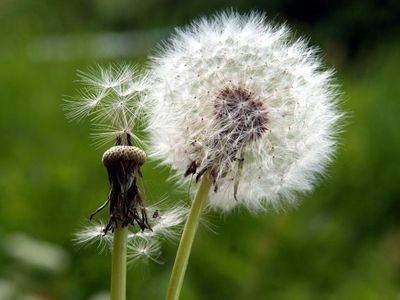Did you know, for instance, that the leaves, flowers, and roots of dandelion are edible or that the dandelion has purported medicinal properties? Bees and other pollinators also rely on them for a nectar source early in the growing season. It’s true! So, what are you waiting for? Let’s find out how to grow dandelion seeds and when to sow dandelions!
Propagating Dandelion from Seed
It is said that there are over 250 species of dandelion in existence, though the variety known as “common dandelion” (Taraxacum officinale) is the one that is most likely populating your lawn and garden. Dandelions are quite resilient and, as such, can withstand a lot of less-than-ideal growing conditions. If you’re growing dandelion as a food source, however, you will want to grow it in conditions that are conducive to yielding high quality, and hence better tasting, dandelion greens. And by better tasting, I am alluding to the bitterness factor. The taste of dandelion is a bit on the bitter side. Hardy to zone 3, dandelions grow in sun or shade, but for better tasting greens a partial to full shade location is ideal. The best soil for dandelion seed growing is characteristically rich, fertile, well-draining, slightly alkaline, and soft down to 10 inches (25.5 cm.) deep because dandelion roots grow deep. Seeds can be obtained from seed companies or you can try propagating dandelions from seed by collecting seeds from the heads of existing plants once the head transforms into a globe-shaped puffball. Now, let’s talk about planting seeds of dandelions.
How to Grow Dandelion Seeds
You may be wondering when to sow dandelions in the garden. Seeds can be sown anytime from early spring to early fall. In terms of spacing, it is recommended to maintain a spacing of 6-9 inches (15-23 cm.) between plants in rows 12 inches (30.5 cm.) apart for dandelion seed growing. If your intent is to just grow young leaves for salads in a continual harvest, then sowing seeds more densely in short rows every few weeks would be a workable alternative. To help boost germination rates, you may want to consider cold stratifying your seeds in the refrigerator for a week or so prior to planting the seeds of a dandelion. Given that dandelion seeds require light for germination, you will not want to completely submerge your seeds into the soil – just lightly tamp, or press, the seeds into the soil surface. Another tip for good germination, and for a tastier crop, is to keep the planting area consistently moist throughout the season. Seedlings should appear within two weeks after the seeds are sown.
Planting Container Grown Dandelion Seeds
The process for growing dandelions in pots isn’t much different than for growing in the garden. Use a pot with drainage holes that are at least 6 inches (15 cm.) deep, fill it with potting soil and locate it in a bright indoor area. The width of your pot, the number of plants you grow in that pot, and how densely they are planted really depend on your purpose for growing them. For example, you will want to give plants you intend to grow to maturity a bit more space than those you are growing just for salad greens. One recommendation is to space seeds 2-3 inches (5-7.5 cm.) apart in the container for full-grown greens, and more densely for baby greens. Lightly sprinkle a scant amount of potting soil over the seeds, just barely covering them, and keep the soil consistently moist. Fertilizing occasionally throughout the growing period with a general-purpose fertilizer will also give the dandelions a boost.
